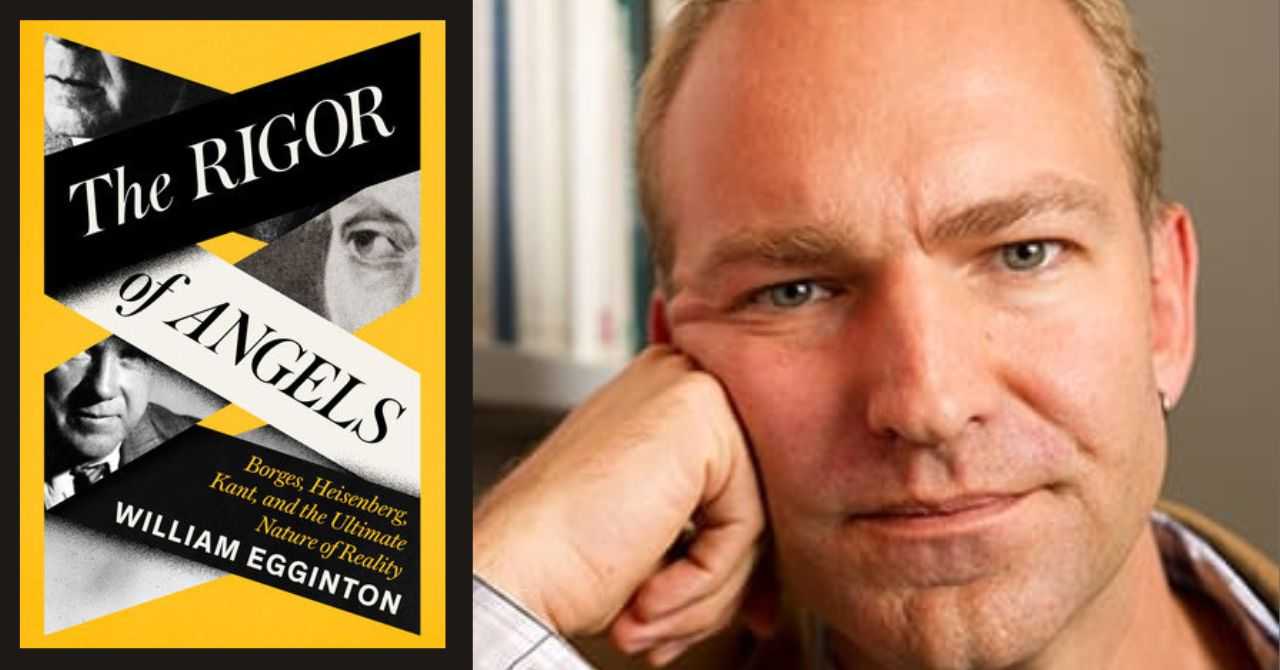- Cafe
- Bookstore
- Upcoming events
- Book an event
- Catering
- Institutional and bulk sales
- About Red Emma's
- Press
- Buy gift cards
- Red Emma's merch
- Jobs
- Red Emma's Education Fund
- Oleander
- Baltimore Book Festival 2025

William Egginton presents "The Rigor of Angels" in conversation with Katharina Kraus
This event has already happened.
Argentine poet Jorge Luis Borges was madly in love when his life was shattered by painful heartbreak. But the breakdown that followed illuminated an incontrovertible truth—that love is necessarily imbued with loss, that the one doesn’t exist without the other. German physicist Werner Heisenberg was fighting with the scientific establishment on the meaning of the quantum realm’s absurdity when he had his own epiphany—that there is no such thing as a complete, perfect description of reality. Prussian philosopher Immanuel Kant pushed the assumptions of human reason to their mind-bending conclusions, but emerged with an idea that crowned a towering philosophical system—that the human mind has fundamental limits, and those limits undergird both our greatest achievements as well as our missteps.
Through fiction, science, and philosophy, the work of these three thinkers coalesced around the powerful, haunting fact that there is an irreconcilable difference between reality “out there” and reality as we experience it. Out of this profound truth comes a multitude of galvanizing ideas: the notion of selfhood, free will, and purpose in human life; the roots of morality, aesthetics, and reason; and the origins and nature of the cosmos itself.
As each of these thinkers shows, every one of us has a fundamentally incomplete picture of the world. But this is to be expected. Only as mortal, finite beings are we able to experience the world in all its richness and breathtaking majesty. We are stranded in a gulf of vast extremes, between the astronomical and the quantum, an abyss of freedom and absolute determinism, and it is in that center where we must make our home. A soaring and lucid reflection on the lives and work of Borges, Heisenberg, and Kant, The Rigor of Angels movingly demonstrates that the mysteries of our place in the world may always loom over us—not as a threat, but as a reminder of our humble humanity.
WILLIAM EGGINTON is the Decker Professor in the Humanities and Director of the Alexander Grass Humanities Institute of the Johns Hopkins University. He is the author of multiple books, including How the World Became a Stage (2003), Perversity and Ethics (2006), A Wrinkle in History (2007), The Philosopher’s Desire (2007), The Theater of Truth (2010), In Defense of Religious moderation (2011), The Man Who Invented Fiction: How Cervantes Ushered in the Modern World (2016), Medialogies: Reading Reality in the Age of Inflationary Media (2017), The Splintering of the American Mind (2018) and What Would Cervantes Do? Navigating Post-Truth With Spanish Baroque Literature (2022).
Katharina Kraus is Miller Associate Professor of Philosophy at Johns Hopkins University. Before joining Hopkins in January 2023, she taught at the University of Notre Dame and the Albert Ludwigs University Freiburg and was a post-doctoral fellow at the Hebrew University of Jerusalem. She holds an MA in physics from the Ruprecht Karls University Heidelberg and an MPhil in the history and philosophy of science and a PhD in philosophy, both from the University of Cambridge.
Kraus is the author of Kant on Self-Knowledge and Self-Formation (Cambridge University Press, 2020) and she is currently working on a short monograph on Kant's Ideas of Reason (Cambridge Elements Series). Her current research project, The Life of the Mind, explores theories of mental development and personal growth in the tradition of transcendental philosophy that model the mind on a conception of life. She also has strong interests in the work of women philosophers in the German tradition of the long nineteenth century and studies in particular Lou Andreas-Salomé (1861–1937) and Edith Stein (1891–1942). Her systematic research interests include topics such as self-consciousness, the first-person perspective, personal identity, and self-constitution, as well as expressivism, contextualism, and perspectivalism.

